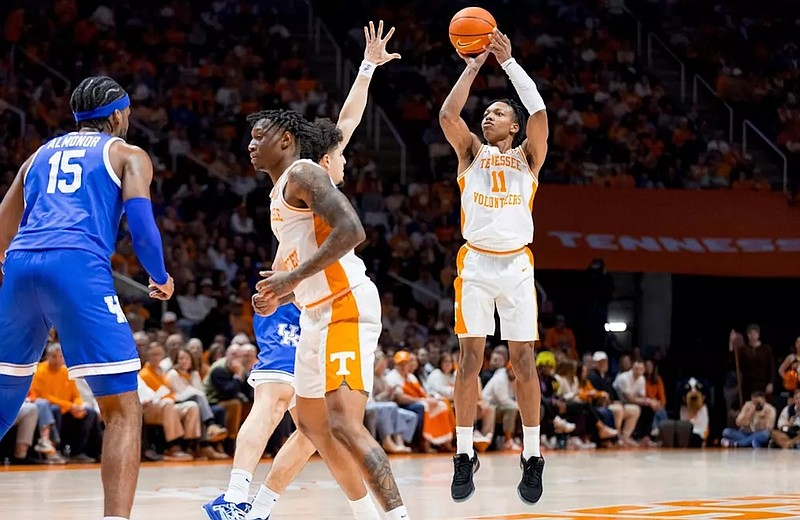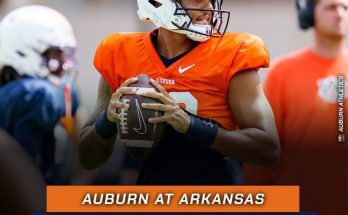Vols Facing Challenges with 3-Point Shooting: A Struggle to Make and Defend the Long Range
The Tennessee Volunteers men’s basketball team has long been known for its intense defense, physicality, and fast-paced play. Under head coach Rick Barnes, the Vols have developed a reputation as one of the toughest teams in the country. However, despite their success in various areas, one of the biggest challenges this season has been their inconsistency with 3-point shooting. Both making and defending the three-point shot has become a critical issue for the Vols, impacting their offensive flow and defensive strategies.
As the team navigates through the rigorous SEC schedule, it’s clear that the 3-point struggle is one area that needs attention if Tennessee wants to stay competitive at the national level. In this article, we’ll explore the challenges the Vols are facing with their 3-point shooting and defense, as well as how these issues can be addressed moving forward.
Offensive Struggles: Making the 3-Point Shot
The 3-point shot has become an increasingly important weapon in college basketball, with many programs relying on it to space the floor and stretch opposing defenses. Tennessee, however, has found it difficult to consistently convert from beyond the arc this season. While they have talented shooters on the roster, the team has struggled to find offensive rhythm from the 3-point line.
The Vols’ 3-point shooting percentage ranks below average in the SEC, with many of their key shooters having an off-year in terms of accuracy. Players who have been reliable from the perimeter in the past have seen their percentages drop this season. This inconsistency has affected Tennessee’s ability to score in high-pressure situations, especially when they face defenses that collapse in the paint to slow down their inside game.
One of the reasons for this issue is a lack of ball movement and spacing on the offensive end. At times, Tennessee has relied too heavily on isolation plays or individual efforts, which has led to stagnant possessions. When the ball doesn’t move freely around the court, defenders can easily key in on shooters and close out quickly, making it harder for the Vols to find clean looks from deep.
Another contributing factor is shot selection. Tennessee has occasionally settled for contested 3-point attempts, particularly during stretches where they are struggling to score. While aggressive play can lead to high-reward shots, it also opens the door for inefficient possessions that don’t always produce the best outcomes.
Key Players Struggling from Beyond the Arc
Several key players have struggled with their 3-point shooting this season, and their performance from deep has been a significant factor in the Vols’ struggles. Senior guard Santiago Vescovi, a player known for his shooting ability, has had an inconsistent campaign from beyond the arc. Although he is still a dangerous offensive weapon, his shooting percentages have not been up to the level fans have come to expect.
Other players, like Zakai Zeigler and Josiah-Jordan James, have also faced challenges from deep. Zeigler, known for his quickness and playmaking ability, has not been able to find consistency as a 3-point shooter. James, who has shown flashes of being an effective perimeter shooter, has struggled to convert open looks with regularity.
This lack of shooting efficiency from the perimeter has forced Tennessee to rely more heavily on its inside game and mid-range shooting, but the absence of a consistent 3-point threat has limited their offensive flexibility. Against teams that pack the paint defensively or those that play aggressive zone defenses, Tennessee has been forced to take difficult shots or settle for less effective scoring opportunities.
Defensive Issues: Struggling to Defend the 3-Point Shot
On the other end of the court, Tennessee’s defense has always been a staple of Rick Barnes’ teams. However, this season, the Vols have also had trouble defending the 3-point shot. While their defense remains stout in many areas, particularly when it comes to protecting the paint and forcing turnovers, they’ve been vulnerable from beyond the arc.
One of the main issues with Tennessee’s perimeter defense has been their inability to close out effectively on shooters. When defending the 3-point line, Tennessee’s defenders have at times been late to contest shots, allowing opposing shooters to get clean looks from deep. Whether it’s a lack of communication or simply poor decision-making, the Vols have given up more open 3-point opportunities than they would like.
Another issue is fouling beyond the arc. Tennessee has had moments this season where they’ve put shooters on the free-throw line by fouling on 3-point attempts. This not only gives the opponent free points but also disrupts the flow of the game. Aggressive defense is one of the Vols’ trademarks, but it has occasionally led to reckless fouls at inopportune times.
Additionally, Tennessee has struggled with switching on defense. Against teams that run a lot of ball screens or quick passing actions, Tennessee’s defenders have had difficulty staying with shooters after switches, leading to open 3-point looks. This breakdown in defensive communication has resulted in the Vols giving up more 3-pointers than they are accustomed to.
The Importance of Improving 3-Point Shooting
For Tennessee to reach its full potential this season, improving its 3-point shooting is a must. College basketball has increasingly become a game where perimeter shooting can make or break a team’s offensive flow, especially in the SEC, where many teams are efficient from beyond the arc.
Having a consistent 3-point threat would open up opportunities for the Vols to stretch the defense, making it easier for their guards and forwards to attack the basket. When Tennessee is able to hit shots from deep, it forces opposing defenses to respect the perimeter, thus creating driving lanes and better offensive spacing. It would also allow Tennessee to take advantage of defensive breakdowns and force teams to defend in a way that favors the Vols’ offensive strengths.
In particular, improving their 3-point shooting would take pressure off Vescovi, Zeigler, and James, allowing them to play more freely and within the flow of the offense. This would open up more passing lanes and create better opportunities for their teammates, giving the Vols an added dimension to their offense.
The Need for Better Perimeter Defense
Improving Tennessee’s perimeter defense is just as important as their offensive struggles with the 3-point shot. In the modern college game, being able to effectively defend the three is crucial for success. Programs that struggle to defend the perimeter often find themselves giving up big runs or falling behind in games, as opposing teams can easily rack up points from deep.
Tennessee’s defensive system has traditionally been one of the best in the nation, but they must address their 3-point defense issues if they are to be truly elite. This starts with better communication and more discipline in terms of closing out on shooters. The Vols need to ensure they are contesting shots without fouling, and that they’re not giving up easy looks from beyond the arc.
Additionally, Tennessee must be more effective at switching on ball screens and staying attached to shooters off the ball. Defenders should work on improving their footwork and positioning to ensure they are always in the right place to contest shots and prevent open looks.
How Tennessee Can Address These Issues Moving Forward
As the Vols look to improve their 3-point shooting and defense, there are a few areas they can focus on:
- Player Development: Players like Vescovi, Zeigler, and James need to work on their shooting mechanics and mental approach to perimeter shooting. Regular shooting drills, more spot-up shooting opportunities, and a focus on creating open looks will help boost their confidence and shooting percentages.
- Offensive Spacing and Ball Movement: Improving spacing and ball movement on offense will help create better opportunities for open shots. By running more fluid, off-the-ball movement, the Vols can help their shooters get clean looks from the perimeter, as well as prevent defenders from keying in too heavily on one player.
- Defensive Discipline: Tennessee’s defenders must focus on closing out effectively, contesting shots without fouling, and improving their footwork on switches. Communication and awareness will be key to limiting 3-point opportunities for opponents.
- Coaching Adjustments: Rick Barnes and his coaching staff can continue to emphasize the importance of 3-point shooting and defense in practice, ensuring that these areas become priorities moving forward. Additionally, adjusting defensive schemes to account for opposing teams’ 3-point threats could be an effective strategy.



